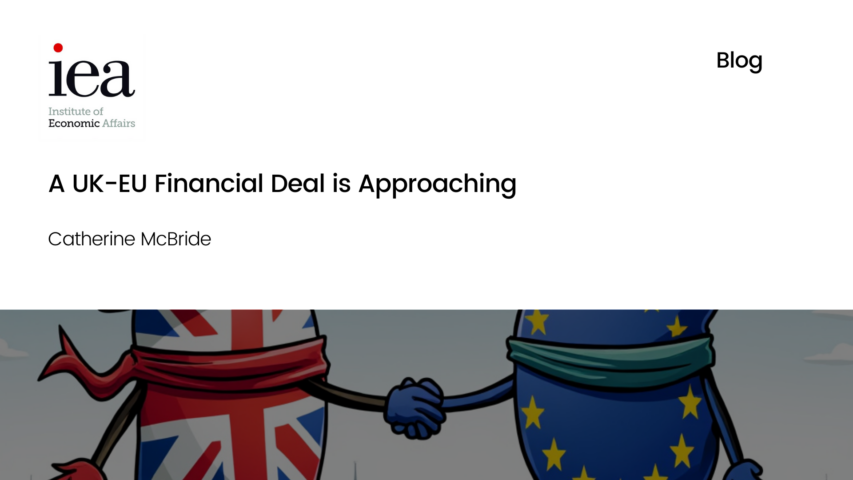A UK-EU Financial Deal is Approaching

A UK-EU Financial Deal is Approaching
Catherine McBride // 11 April 2018
One year after the triggering of Article 50 an acceptable deal on financial services between the UK and the EU now looks likely. In the EU Guidelines published last month the European Council confirmed its readiness to work towards a Free Trade agreement in, amongst other things, trade in services, with the aim of allowing market access to provide services under host state rules, including right of establishment for providers – such that the UK will become a third country and will no longer share a common regulatory, supervisory, enforcement or judiciary framework with the European Union.
No one in the UK appeared to be particularly upset by this: The City of London has moved its position from demanding that financial Passporting is retained to now lobbying for mutual recognition in financial services. The consensus opinion is that the City must not become a rule taker after the UK leaves the EU.
Giving a speech on March 7th, the British Chancellor of the Exchequer advocated that the principles for a future UK/EU partnership in financial services should be durable, reliable, based on reciprocal cooperation prioritising financial stability, and form part of a wide-ranging Free Trade Agreement. Not so far away from the Council.
The Chancellor also emphasized that the City is too big and too dominant to be covered by the European Commission’s existing equivalence regime, especially as equivalence doesn’t cover all areas of financial services presently provided from the UK. The two jurisdictions will need to developed an enhanced equivalence regime in order to continue doing business.
The availability of capital, hedging instruments and foreign exchange is necessary for developing and expanding businesses, and the UK provides 90% of this type of wholesale banking to the EU27. There is a massive cost-efficiency of having a centralized financial market which allows a large pool of capital, liquidity and human expertise to accumulate. This is why over the past 30 years financial services have centralized in New York, Chicago, London, Singapore and Hong Kong.
Although some European politicians see the development of an eurozone based financial centre as a symbol of the EU’s “ever closer union”, the time and additional capital that it would take to establish such a banking centre makes it unrealistic as well as unnecessary. In their 2017 paper Sapir, Schoenmaker and Veron, state that in order for the UK’s banking industry to move to the EU27, the EU27 would need: governance reform, greater power for ESMA, completion of the Banking Union, policy integration, improved infrastructure, an increased skills base, English language proficiency, as well as more flexible tax and employment laws. Such a comprehensive list of reforms would take some time to achieve.
In the meantime, it is imperative for EU businesses that the EU and UK agree to a means of maintaining integration in wholesale banking if only on an interim basis, until a formal agreement between the UK and the EU is concluded.
Equally, the UK should not fear that the EU’s financial equivalence regime will turn the City into a rule-taking vassal state. Countries granted EU equivalence do not need to have identical rules to the EU.
Going forward, with the UK the dominate provider of financial services, if the UK diverges from the present regulations, it will be the EU that has to consider whether to follow suit or diverge. Conversely, the UK is a global financial market place, with open financial markets, particularly in wholesale banking, based on mutual recognition of regulatory standards: if the UK allows banks from the US, China, Brazil, Saudi Arabia and India to operate in the UK, it is unlikely to deny access to an EU bank with similar or even identical regulations.
The UK regulators have reiterated this point: The Bank of England has announced that EU banks with branches in the UK can remain operating here provided there is a cooperative arrangement with their home regulator.
While there are still some bugs to be ironed out in a financial agreement, such as the continuation of contracts, data sharing and clearing services, there is growing consensus on both sides of the channel that this will be done. Even Robert Ophele, Chairman of France’s Financial Market Authority speaking in London in March 2018, reluctantly accepted that as it is in everyone’s interest to reach an agreement on financial services, stating that Brexit should change nothing in financial services (except perhaps direct marketing of financial products to retail customers).
The cost efficiency of a centralised financial market like London is indisputable. A second or third or fourth financial center arising from the eurozone to rival London is possible but not probable – and a better alternative is already available.
EPICENTER publications and contributions from our member think tanks are designed to promote the discussion of economic issues and the role of markets in solving economic and social problems. As with all EPICENTER publications, the views expressed here are those of the author and not EPICENTER or its member think tanks (which have no corporate view).



